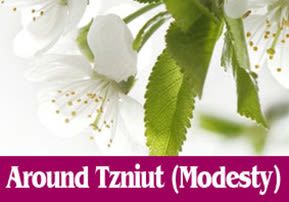In past articles we addressed the importance of tzniut (modesty) in dress as a method of assisting in maintaining and elevating the state of a Jewish woman’s naturally pure and precious neshama (soul), as well as the function of the halachot (laws) of tzniut in dress in enforcing its preservation. However, cherishing the value of tzniut does not merely refer to supervising one’s dress. Rather it applies to dress, manner, action, and speech, or in other words to a woman’s character on a whole and how she chooses to portray it. Attention to tzniut in all of these areas is what truly refines a Jewish woman and allows her to enhance and emphasize her neshama’s purity and sanctity.
Tzniut in Manner and Action
The word tzniut has several connotations. Often it is used to refer to modesty in dress or conduct, but it also means humility or unpretentiousness in disposition. Acting with humility, or tzniut, means acting in opposition to one’s pride, rather than seeking recognition and compliments. While there is nothing wrong in receiving either of these or making an effort to act in a way that is deserving of such praise, a tzanua‘s purpose in conducting herself with modesty is not admiration. A tzanua woman is expected to act with innocence and moral purity, giving a sense of holiness rather than pride and impertinence.
It is taught in the Talmud that women were given a sense of embarrassment and shame more than men, a further hint to our inner susceptibility towards tzniut. In fact, it is this very trait of humility within us that allows us to act with the refinement that the laws of tzniut in dress and speech require. Without an innate appreciation for such a mannerism, it can be quite difficult to hold oneself back, whether in action, dress, or speech.
Tzniut in Speech
Speech is the quality that makes humans superior to all of Hashem‘s creatures. Chazal (our Sages) even say that a person’s character is deeply affected by the manner in which he speaks. Therefore, it is very important to pay attention to and maintain pure and refined speech. In Eishet Chayil (Woman of Valor), which we say every Shabbat evening, the woman is described in the verse, “She opened her mouth with wisdom and teachings of kindness were on her tongue,” to show that a woman with proper tzniut takes care to guard her speech so that only the proper “kindness” is emitted. Not only as humans is our speech given significance, but further as women, our speech is emphasized, as it affects and embodies our pure neshamot (souls). Therefore, we must take particular care in the content of our speech, our choice of words, and how we express them. This includes guarding ourselves from lashon harah (speaking negatively about others), gossip, loud and boisterous speech, using unrefined or offensive language, and speaking about private things in public atmospheres. The woman’s natural proclivity towards humility, as mentioned above, assists her in this expression of tzniut; however, great attention and care are still necessary in order to master true tzniut of speech.
The Vilna Gaon stated in a letter that the yetzer harah (Evil Inclination) can be neutralized by men through Torah study and by women through tzniut, as tzniut gives women a boost of kedusha (holiness) and emet (truth). Therefore we see that tzniut, in all capacities – dress, manner, action, and speech – not only augments and enhances our feeling of preciousness as women, it not only allows our neshamot to manifest their authentic and flawless purity, but it also helps us along the way to guard ourselves from that which might upset our efforts and cause us to sin, misrepresenting these very neshamot. Tzniut guides us along the path of maintaining our own personal purity and refinement, as well as provides a role model for our future generations and all those around us to follow in similar footsteps. With this, we are able to succeed in the great task given us as women to preserve the eternal purity of the Jewish people.
At this point, one may think: there’s a lot to tzniut, and it seems like quite a responsibility. Many ba’alei t’shuva (people who have grown in the observance of Judaism and the keeping of the mitzvot) express that with time they learned to value and cherish Shabbat, rather than experience it as a difficult day where certain activities are prohibited, as they realized that these prohibitions actually create the spirit and uniqueness of the day. So too with tzniut, the initial feelings that such laws will be difficult and unpleasant to follow fade into a love and appreciation for the kedusha it brings to our lives and for the preciousness we begin to emanate as our neshama‘s invaluable purity is manifested through modest dress and conduct.
B’ezrat Hashem (with G-d’s help), we should all be successful in working on our tzniut and connecting with this beautiful mitzvah, as it only brings us closer to feeling our true preciousness as women and to forming a deeper and more meaningful connection with Hashem.
(Several helpful notes for this article were taken from Rabbi Pesach Eliyahu Falk’s book on tzniut, Oz V’hadar Levusha – Modesty: An Adornment for Life, Gateshead, England, 1998.)










Tell us what you think!
Thank you for your comment!
It will be published after approval by the Editor.